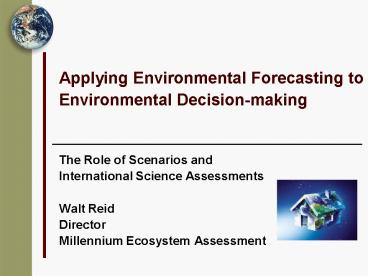Applying Environmental Forecasting to Environmental Decisionmaking - PowerPoint PPT Presentation
1 / 21
Title:
Applying Environmental Forecasting to Environmental Decisionmaking
Description:
Scenarios are important and underutilized tools for communicating long-range ... E.g., Northern Cod. Millennium Ecosystem Assessment ... – PowerPoint PPT presentation
Number of Views:47
Avg rating:3.0/5.0
Title: Applying Environmental Forecasting to Environmental Decisionmaking
1
Applying Environmental Forecasting to
Environmental Decision-making
- The Role of Scenarios and
- International Science Assessments
- Walt Reid
- Director
- Millennium Ecosystem Assessment
2
Conclusions
- Scenarios are important and underutilized tools
for communicating long-range forecasting
information to decision-makers - Provide valuable means of engaging
decision-makers - Still major hurdles in building ecology into
global scenarios - Global scientific assessments can be powerful
mechanisms for bringing forecasting information
to bear on decision needs. - Most effective if they function as a dialogue
between scientists and decision-makers. - Model has considerable application at national
and local levels
3
What is the Millennium Ecosystem Assessment?
- Modeled on the Intergovernmental Panel on Climate
Change (IPCC) - Assessing the consequences of ecosystem change
for human well-being. - Launched by Kofi Annan in 2001, authorized by
CBD, UNCCD, Ramsar Convention, CMS. - Approximately 1300 experts from 95 countries
involved.
Stay Tuned Findings will be announced on March
30, 2005
4
Over the past 50 years, humans have changed
ecosystems more rapidly and extensively than at
any time in human history.
- E.g., Flows of reactive nitrogen in terrestrial
ecosystems doubled since 1960. More than half of
all the synthetic nitrogen fertilizer ever used
on the planet has been used since 1985 - Flows of phosphorus tripled since 1960
5
The changes made to ecosystems have contributed
to substantial net gains in human well-being and
economic development, but these gains are being
achieved at growing costs in the form of
6
1. Degradation and Unsustainable Use of Ecosystem
Services
- More than 60 percent of the ecosystem services
evaluated are being degraded or used
unsustainably - Regulating services
7
2. Increased likelihood of large magnitude,
non-linear (stepped) and potentially abrupt
changes in ecosystems.
- E.g., Northern Cod
8
3. Exacerbation of poverty for some groups of
people and contributions to growing inequities
and disparities
- E.g., rate of population growth now highest in
least productive ecosystems
9
(No Transcript)
10
Scenarios are..
- Structured accounts of possible futures
- Often combine quantitative modeling with
qualitative analysis - Not forecasts or predictions but make use of many
forecasting methods and models
11
Climate Scenarios
- 1000 to 1861, N. Hemisphere, proxy data
- 1861 to 2000 Global, Instrumental
- 2000 to 2100, SRES projections
12
Stratospheric Ozone Scenarios
13
Use in decision-making
- Allow exploration of the consequences of
decisions made today on future outcomes. - Widen perspectives, public education
- Allow testing of strategies and plans under
different futures - Provide an unmatched opportunity to directly
engage decision-makers in discussion and
consideration of scientific findings.
14
MA Scenarios
15
MA Scenarios Habitat change to 1950, 1950-1990,
Scenario for change through 2050.
16
The harmful consequences of ecosystem changes
could grow significantly worse during the first
half of the century. However, three of the
four MA scenarios show that significant changes
in policy can mitigate many of the negative
consequences of growing pressures on ecosystems,
although the changes required are large and not
currently underway.
17
Major barriers still exist in developing global
ecosystem service scenarios
- Availability of models
- many ecological forecasting models are
local/regional - dont exist for many services
- Linkage of models relatively few coupled with
global models - Thresholds and discontinuities are often the most
important issues involved. Extremely difficult
to incorporate these types of surprise events in
scenarios
18
Science Assessment
- A social process to bring the findings of science
to bear on the needs of decision-makers
19
Lessons from other assessments
- ? Political Legitimacy
- ? Scientific Credibility
- ? Focus on User Needs
20
Role of intermediaries
Personal Actions Voting Grassroots
Organizing Lobbying
Private Sector
Intermediaries Press, Media NGOs, Civil
Society Documentaries Opinion leaders
- Science Assessment
- Authoritative
- Policy relevant, not policy prescriptive
- Non-political
- All governments own the findings
- Scientific community stands behind the findings
21
Key Features
- Most successful when process allows a dialogue
between users and scientists - Seek to establish areas of scientific consensus
- But present all credible points of view or
scientific results and identify areas of
scientific disagreement. - Identify where insufficient knowledge exists to
answer a policy-relevant question - Apply judgment of scientists but explicitly state
the level of certainty concerning conclusions - Policy relevant but not policy prescriptive































